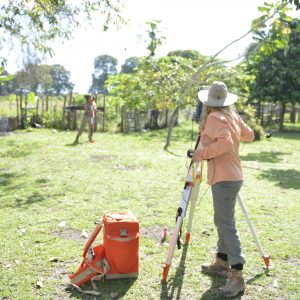Grace Ellis
Summer 2024

Identifying Pre-contact Ports and Construction in the Amazon
Doctoral candidate Grace Ellis is the lead author on a new archaeological study, published Spring 2024, that has identified the first known occurrence of pre-European-contact, constructed wharves at the port site, Macurany, located along the Middle Amazon River in Brazil.
The open-access article, “A Port By Any Other Name: Preliminary Spatial Analysis of Ancient Infrastructural Landscapes and Settlement Organization at Macurany, Brazil,” published in the journal, Latin American Antiquity, also documents middens, terra preta — dark, nutrient-rich, human engineered soils — and forests that show signs of cultural management dating back centuries.
Ellis, Professor Chris Fisher (who is also her advisor), and colleagues from University of Louisville and the Museu Paraense Emílio Goeldi in Brazil, conclude that the range of past activities suggest the ancient inhabitants were actively and intensively altering and engineering their landscape for subsistence and settlement – but also engineering infrastructure, like wharves, and building urbanized spaces. The findings expand – and challenge – archaeologists’ understanding of settlement and environmental change in the ancient Amazon.
Defining Infrastructure for Archaeology
For her doctoral research and dissertation, Ellis focuses on modeling ancient maritime trade routes across the Caribbean Sea to understand the interactions among different Indigenous and island peoples prior to European contact. She also teaches Introduction to Archaeology (ANTH 140) and works as a graduate TA.
Ellis and fellow alumna Carly DeSanto (ANTH MA ’21) have co-edited a new 2024 book, with colleague Meghan Howey, that explores an increasingly important set of questions in the field: How do archaeologists define what is infrastructure and how does that influence our views of past communities and their group collaboration and social networks?
The book, Infrastructure in Archaeological Discourse: Framing Society in the Past, published by Taylor & Francis, gathers insight and research from archaeology researchers to and includes chapters by several CSU faculty, including Ellis, Fisher, and Associate Professor Edward Henry, and other colleagues.